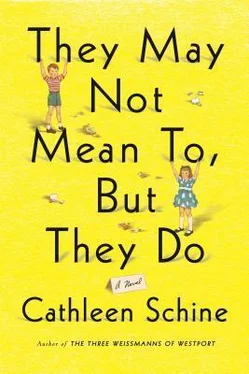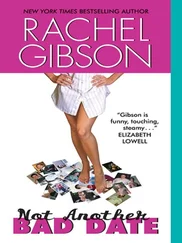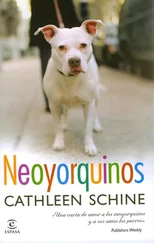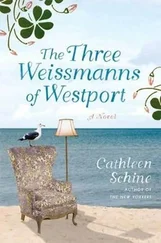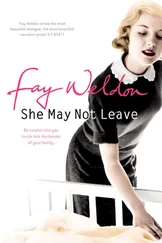“She’s always on the phone,” she whispered to Freddie. “And she’s secretive.”
She thought it was usually Daniel, sometimes Natalie or one of the other girls. But it could be Karl, for all she really knew.
“She probably misses her cronies, her routine. Old people like routine. That’s what they keep telling me at Dad’s place. That’s one of the things they can’t understand about him. He hates routine.”
Molly kissed Freddie. “That’s it! You are a genius. We’ll take her to visit your father. She’ll see her peers and feel less lonely. We’ll take her to Green Goddess!”
* * *
Joy sat glumly in the backseat. The thin end of the wedge. The way they talked this place up, as if it were a resort in the Caribbean — it had happened to her friends, but she had not really expected this from Molly, her own daughter.
“I plan to go back to work in the fall,” she said.
“One day at a time,” Molly answered.
The parking lot seemed to be home to a number of cats.
“Pets are allowed,” Freddie said, “but the cats are feral.”
The building was pink stucco. The rooms had small balconies. In the center of an inner courtyard a fountain bubbled, and there was a front desk like a hotel. The whole place felt like a hotel, actually, a small hotel just a bit down at the heels.
“Not bad, right?” Freddie said.
Joy gave a weak smile.
They had lunch in the dining room. Joy was alarmed by the bibs the residents wore, but the food was quite good. She had never met Freddie’s father before this, which struck all of them as odd.
“Where have they been hiding you?” Duncan asked.
“I live in New York City.” It felt good just to say that: I live in New York.
“What are you doing here with these two harridans?”
“We thought it would be nice for you two to meet, that’s all,” Freddie said.
Joy felt something on her knee. A hand.
“Well, it’s about time, says I,” the owner of the hand said. He gave Joy his handsome smile.
Joy shifted, freeing her knee. “Oh yes.”
A woman at a nearby table was glaring at her. Joy took a bite of her tuna-fish sandwich. The hand returned to her knee. She felt her throat closing and thought, What if I choke and die with my daughter’s father-in-law’s hand on my knee?
“So when did you move into Green Acres?” Duncan said.
“Excuse me?”
“She doesn’t live here, Dad. She’s staying with us.”
“Green Acres? That’s a good one,” Molly said.
“Remember Zsa Zsa Gabor?” Joy said. “Those were the days.”
“That was Eva Gabor.”
“Sweet girl, Zsa Zsa,” said Duncan. “We worked together. Years ago, years ago.”
As Duncan described an obscure movie in which he had an even more obscure part, Joy noticed Freddie raising an eyebrow at Molly. They exchanged just noticeable smirks. Joy kicked Molly under the table, which had the advantage of also dislodging Duncan’s hand.
“A little respect,” Joy said, first to Molly, then to Freddie’s father. “A little respect.”
“Nothing will come of nothing,” said Duncan in his rich and sonorous voice. He tried his smile again.
“Wasn’t that fun, Mom?” Molly asked as they drove home. “Jesus, Freddie, do you actually aim for the potholes?”
Freddie laughed.
Freddie really was good-natured, Joy thought. “Your father is a ball of fire,” she said. She would not mention the hand. What would be the point?
“Never underestimate a minor character actor,” Freddie said. “It’s already been done. Their whole life.”
“Who was that woman who tried to trip us with her walker?” said Molly.
Freddie shrugged. “One of his girlfriends?”
“I’m sure that was an accident,” said Joy. But Green Garden was even more frightening than she had imagined.
* * *
Joy leaned on the grocery cart, weary in body and soul. It was an expensive, trendy grocery store, the kind of grocery store in which half the children were probably not vaccinated against measles. Molly examined a small ugly root vegetable.
“I think you girls deserve some privacy,” Joy said. “You’ve been so hospitable.” She had tried this before but gotten nowhere, and this time, too, Molly smiled an abstracted smile and said, “Don’t worry about it, Mom.”
Joy pushed the cart to the fish counter and waited for Molly to catch up. She missed her apartment, her lonely apartment in which she could roam and mourn at will. She missed the doormen. She missed her friends. She missed the park and Karl.
“I’m homesick, Molly. I keep trying to tell you nicely. I want to go home.”
“I understand that you’re not completely adjusted—”
“Adjusted? No, I’m not adjusted. I don’t want to be adjusted.” Joy realized she was speaking loudly and the mothers of unvaccinated children were glancing at her suspiciously. Careful, Joy. Don’t rile up the natives, don’t rile up Molly, especially. “Sweetheart, you and Freddie have been absolutely wonderful, but put yourself in my position.”
“That’s just what I was talking to Daniel about, and we decided that even more than the change in scenery, even more than the warm weather, that what you need is to be useful.”
“Yes,” said Joy, suddenly jubilant. At last her son and daughter understood.
“Everyone needs to be useful.”
“That is so true.” She would go back to work and insist on getting her projects back. She would call Norman, that fellow on the board, the one who Aaron used to play poker with, why hadn’t she thought of it before …
“We thought you could do something at the Getty, maybe.”
“The Getty?”
“Yeah, you know, like volunteer. Or the Skirball. The training for docents is pretty rigorous, but still…”
Molly prattled away about Los Angeles museums and their volunteer programs as they loaded the cart with healthful food that Joy could not digest. Joy searched the shelves for Cream of Wheat and said, now and then in hopeless punctuation of Molly’s recitation, “Such good ideas! If only I did not already have a museum. In New York.”
One evening when Molly was at a meeting and not coming home until late, Joy and Freddie went out to dinner, just the two of them. It was the first time they had done anything like that, and they were both a little nervous, Joy’s discomfort manifesting itself in silence, Freddie’s in chatter.
“Molly doesn’t like this place, she thinks it’s boring, but I love it and I think you might like it, too. The traffic will be impossible on the 10, even in this direction, so I think I’ll take Venice, oh my god, look at them trying to get to the 405…”
Joy opened the window and let the cool air in. It smelled like flowers even on this busy street. She braced herself for yet another restaurant with painfully loud music, painfully hard benches, women in painfully high heels and men comfortable in sneakers, all of them eating spicy, fishy fragments of raw things on little saucers. It was the same in New York, she supposed, but she never went to restaurants like that in New York. She was in the mood for spaghetti and meatballs.
It seemed like a long time before they finally pulled into a parking structure, then spiraled down several levels until they found a space. Disoriented, Joy squeezed out of the car and followed Freddie to an elevator that took them back to street level. Freddie was still talking. Something about her department at the university trying to screw someone over in a fourth-year review and a committee that never met. Joy thought of the museum, of Miss Georgia, of all the orphaned artifacts she could no longer tend to. She was grateful to Freddie for talking, for trying. Freddie was a good sport. Joy remembered being a good sport. It required energy and optimism and faith, and it had been quite rewarding. Really, she had spent her entire life being a good sport. But to what end? She had grown old and uncomfortable, just like a bad sport. And now she was a bad sport. There was no protection in good behavior. She felt suddenly compassionate toward Freddie, struggling on in a unilateral conversation that would not protect her from the disappointments of old age.
Читать дальше
